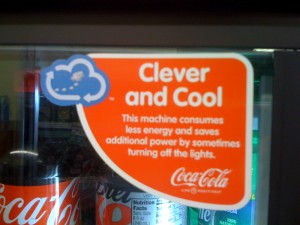
Here’s an example of how not to write copy – a sticker that indicates that the machine to which it is applied saves power by “sometimes turning off the lights”. I have several problems with this.
It Reeks of Greenwashing
Okay, so Coca Cola wanted to advertise the fact that their refrigerator sometimes turns off the lights to save energy. I am left to wonder if this marketing campaign actually changed anything about the efficiency of their refrigerators (like using double-pane glass or otherwise improving insulation) or just slapped on stickers in order to generate more sales. If I had to guess, I would assume the latter.
It’s Redundant
Copywriting fail. The way I interpret this, it is indicating that the light timer both “consumes less energy” and “saves additional power”. That’s like a job description with the primary responsibility to “find” and “locate” a sought-after spacecraft.
It Obfuscates the User’s Mental Model
Interested in using a computer that “sometimes turns off” or sending a letter that will “sometimes get delivered”? Granted, the interaction a user has with this refrigerator is simple and brief, but this sticker inadvertently creates a muddy mental model.
Examples of design that produces an incorrect mental model abound. Donald Norman’s classic assessment of a home thermostat in The Design of Everyday Things is a familiar one. Another case is placebo buttons: “close” buttons on elevators that were never wired up, pedestrian crossing buttons at intersections that had once been functional but were superseded by computer systems, etc.
Sometimes keeping the user’s mental model incomplete is important to thwart people with the intent of gaming the system. The Swiss Franc has several security features, but some apparently are kept secret. Google search results are generated based on more than 200 signals, most of which are not made public. By contrast, the pin-tumbler lock, the most widespread lock in the Western world, is based on a simple mechanism that has been exposed, and at the time of writing, a Google search for “how to pick a pin tumbler lock” yields 393,000 results.
In this case, it’s just sloppiness confusing the user.